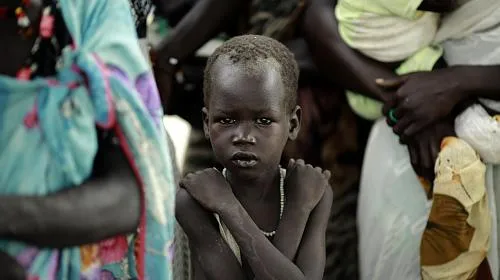Juba, South Sudan, 9th July 2022 – As the country marks 11 years of independence on 9th July, there is a lot to reflect on, as the country continues to face deteriorating humanitarian conditions. These have been exacerbated by endemic violence, access constraints, public health challenges such as the effects of cholera, COVID-19, and climatic shocks from flooding and localized drought. This has had an impact on people’s way of life and hampers access to education, water, sanitation and hygiene, and health services. The humanitarian situation in South Sudan has worsened despite the relative peace and implementation of the Revitalized Agreement on the Resolution of Conflict in South Sudan(R-ARCSS). In 2022, the humanitarian community estimates that more than two-thirds of the South Sudanese population, 8.9 million people require humanitarian assistance HNO.
This year South Sudan is facing the highest food insecurity levels since its independence. Statistics indicate that 7.7 million people are classified in Crisis or worse, 3 million at Emergency, and 87,000 in the worst level of food insecurity classification, Catastrophic IPC integrated food security classifications.
Meanwhile, protection concerns remain high, especially amongst women and girls who are the most affected. Gender-Based Violence is under-reported due to social-cultural reasons that stigmatize survivors and prevents them from reporting. Lack of available services, including Psycho-social support, for survivors of GBV and limited capacity of national information systems to collect, analyze and disseminate robust GBV data that can be used for advocacy and programming.
Continued intercommunal conflict and violence coupled with flooding have resulted in large-scale displacement. In 2021, 2 million people were internally displaced; 55% of whom are women and girls. “The floods did massive destruction that completely disrupted our lives. Our homes were submerged under water, our food washed away, and animals died. We escaped for our lives. The water level was so high that our children were almost drowning as we could not swim with them across. “We only used plastic sheets to cross them to higher ground,” recollected Kayac Mareng -an Internally Displaced Person from Nhialdu.
In addition, an estimated 2 million people including 1.3 million children under the age of 5 and 676,000 pregnant and lactating women are expected to be at risk of acute malnutrition. Global Acute Malnutrition (GAM) prevalence above the emergency threshold of 15 percent was reported in twenty-six counties in six states (Jonglei, Unity, Warrap, Upper Nile, Northern Bahr-El-Ghazal, and Eastern Equatoria).
While humanitarian needs have dramatically risen, funding is shrinking. As a result, several people may be cut off from critical life-saving support as the world grapples with donor fatigue and funding priorities focusing on the Ukraine crisis. Due to the critical funding shortages, almost one-third of the acute food-insecure South Sudanese will be left without humanitarian food assistance heightening the risk of starvation. Humanitarian assistance is one of the only mechanisms keeping thousands of people from succumbing to the worst outcomes: malnutrition and death.
Abel Whande, CARE South Sudan Country Director said; “South Sudan is grappling with unprecedented levels of food insecurity Alongside many other countries in the region South Sudan is also feeling the knock-on impacts of the Ukraine crisis on food and fuel prices and supply of basic foodstuffs. The country is largely dependent on imports such as wheat, flour, and seed oil from other eastern African countries that in turn rely on imports from Ukraine and Russia. The shrinkage in funding is affecting our ability to respond. If nothing is done immediately, women, girls, and children will adversely suffer the fate we are witnessing in the horn of Africa.
CARE needs additional funding to scale up gender-responsive humanitarian interventions. We need to support affected communities to save lives and livelihoods and prevent the further spread of hunger and associated protection risks for women, girls, and children.
For more information please contact:
Anisa Husain
CARE Press Officer
Anisa.Husain@care.org

